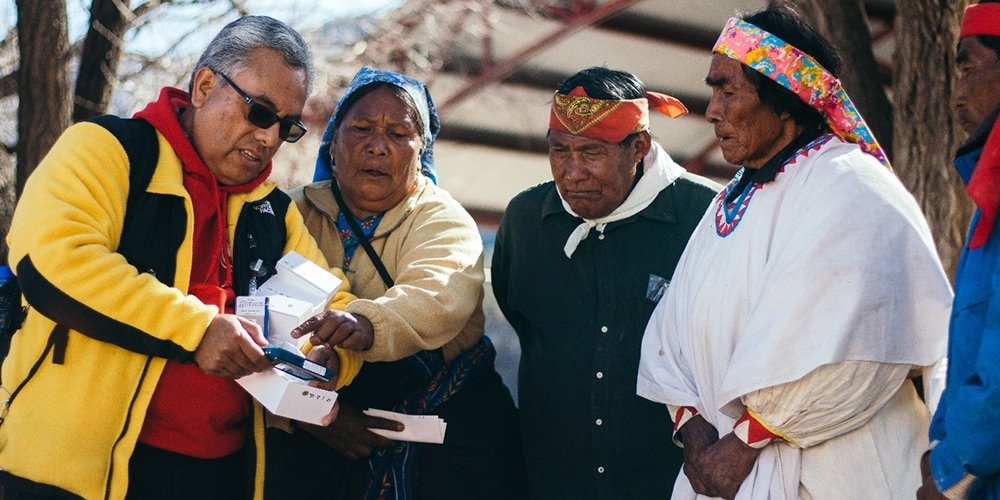
Nearly 50 students, teachers, medical staff, and volunteers from Montemorelos University recently visited several indigenous communities in the mountainous region of Chihuahua in northern Mexico, sharing a message of hope and giving out toys, blankets, clothing, Bible books, and solar radios. The 300 solar radios, called “godpods,” offer Bible study lessons, songs, and programs in the Rarámuri native language, and were donated by Adventist World Radio. In addition, free medical and ophthalmology services were provided to dozens of families.
“La Sierra Tarahumara is a place of great need,” said Agustín Andrade, chaplain of Montemorelos University. ”People have little shelter and endure cold winters every year, and they have great spiritual needs.”
Of the 50,000 Tarahumara inhabitants in Chihuahua, the vast majority are monolingual, Andrade explained. “This ethnic group preserves many pre-Columbian customs, and for years they have received a significant Jesuit influence.” The region has less than 200 Adventist members, and it was important to help the membership there but also the surrounding communities, Andrade said.
The “Extreme Mission” project, which took place December 6-12, 2018, included visits to five communities: Guachochi, Nácarare, Basíhuare, San Juanito, and Cusárare.
It was the second time that university students have visited the mountainous region since 2007. This time, the focus was on teaching values to children, repairing Adventist churches, and providing blankets and clothing for families.
Focus on Values
Booklets highlighting ten values, especially designed by students enrolled in the visual communication design degree, were prepared for the three grade levels of children aged 4-7, 8-10, and 11-13 years old.
“It was different in each community, since [in] many communities we worked in schools with children who were used to working on lessons and writing, yet other children have never received any academic teaching,” explained Rúbi López, professor and coordinator of the visual communication design program.
Church Repairs
As part of the missionary project, students and faculty of the architecture program assessed the needs of three Adventist church buildings three months before the mission trip. Students made upgrades and repaired churches during the seven-day impact in the region.
The Guachochi Adventist Church was the first to be upgraded. Measurements of the church were made to generate the plans, and four design teams focused on adding bathrooms, a hall and kitchen, and a baptismal pool, as well as a pastoral office.
In the Basíhuare Adventist Church and the San Juanito Adventist Church buildings, students remodeled bathrooms and painted walls.
It was important to involve students in the project because missionary projects have the purpose of reinforcing the student’s missionary commitment, said Rubén Hernández, professor in the architecture program and coordinator of the building projects.
“We want students to know that their career is not only to make money, but to preach the gospel through architecture, bettering the lives of individuals, and this was one of the most direct ways available,” Hernández said. “We have to make a difference as Adventist architects with that mission.”
Large Collaborative Project
Organizers said the “Extreme Mission — Sierra Tarahumara” trip represented a substantial investment of funds, logistics, and attention to the community thanks to donations by more than 100 individuals and organizations.
In all, more than 2,000 people benefited from the initiative. About 700 blankets, 200 toys, and 1,000 pairs of shoes were distributed, as well as gloves and scarves.
“It’s not about going out to distract ourselves; it’s about going out to fulfill a mission so that the students, teachers, and members can see how valuable it is to work as a team to fulfill God’s mission,” Andrade said.
Plans are set to revisit the project in La Sierra Tarahumara in two years. The architecture repair work will continue during the coming months.
The original version of this story was posted on the Inter-American Division news site.